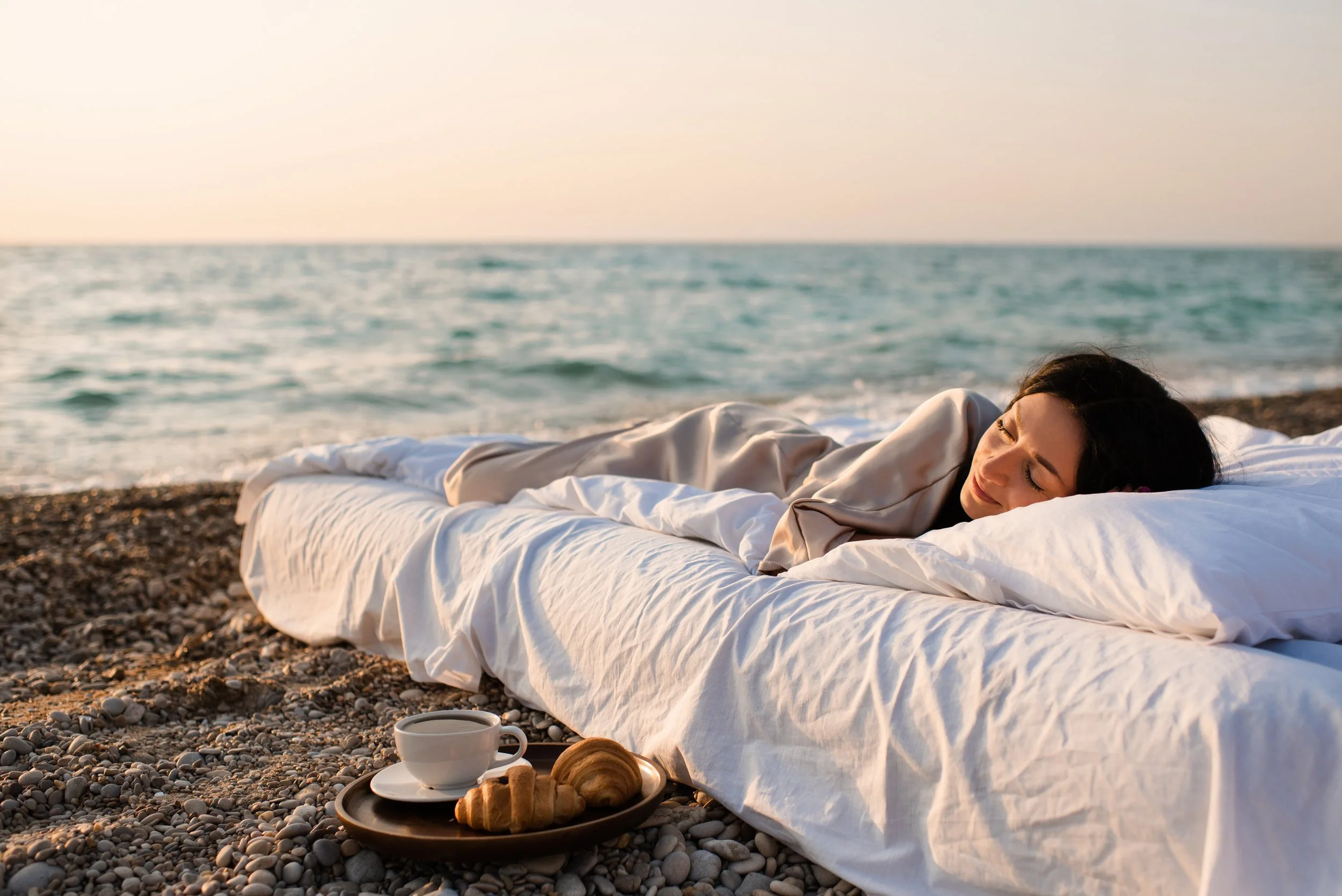Why You May Not Sleep As Well This Summer
By: Kelly Murray, Certified Adult Sleep Coach, FDN-P
Are you starting to stress out that your sleep is going to worsen in the upcoming months because you sleep better in the winter versus the summer?
If so, I want to let you know that you're not alone and this could have nothing to do with you as an individual. Instead, humans might just be wired to sleep longer in the winter versus the summer.
A new study out of Germany shows that individuals, even in an urban environment, sleep an hour less in the summer months versus the winter months. In addition, they get 30 minutes less REM sleep and 30 minutes less slow wave sleep.
Light Pollution
These are really interesting findings because these individuals were in an urban environment and we would assume that light exposure would have less of an effect on their sleep because in the winter they're typically exposed to more light than they normally would because of light pollution. However, we saw that their sleep still worsened in the summer versus the winter months.
The reason that assumption was made was because our circadian rhythm that's the ebb and flow of cortisol, the alert hormone, and melatonin, the sleepy hormone, is influenced by light exposure and inexposure. When our eyes are exposed to light, that tells our body to suppress melatonin and produce cortisol whereas the opposite is true when there's no light that tells our bodies to put the brakes on Cortisol and produce melatonin instead. Therefore, it could be assumed that if you live in an urban environment where you're exposed to artificial light even in the night, that seasonal changes in natural light would have less of an influence on the hours you are required to sleep each night.
Breaking the Myth of 8 Hours
Although more research is needed, this study would indicate that we need to put less pressure on ourselves to get that full 7 to 8 hours of sleep per night in the summer months. I find that a lot of my clients have an idea in their head that they need to get 8 hours and if they don't get 8 hours of sleep they're not going to feel good the next day. And that's in part because of the messaging that we hear in the media as well as from health professionals that 8 hours is the magic number.
These days we're finding that 7 hours is likely what most people need, as we don't work jobs that demand as much physical labor.
In addition, some individuals who aren't good sleepers may be able to do just fine with less than 7 hours of sleep. I find that a lot of my clients do amazing if they can get 6 hours of high quality sleep.
So again, one of the main takeaways from this study is in the summer months you need to adjust your expectations in terms of how much sleep your body needs because it might just be hard coded to sleep less in the summer versus the winter. And that's likely due to evolution because in the summer months we're exposed to more light versus the winter months. And that's just been hard coded into our DNA. And it's important to take the pressure off yourself because if you're worried that you're not getting enough sleep when in fact you are, that's going to increase your anxiety around sleep. And whenever we're anxious our body goes into fight or flight and it's going to be producing cortisol as opposed to melatonin and that's the last thing we want to do when we're trying to sleep.
The other key takeaway from this study is that you might just need to move your bedtime a little later in the summer months, which I think is great news! There's so much going on in the summer, especially in the evening, that I welcome a later bedtime.
Environmental Influences
Although the study is shedding some light on the fact that we naturally sleep less in the summer, I don't want to discount the fact that there are environmental influences that can impact our sleep in the summer months.
The first of those factors being longer days. The sun sets later, it rises earlier and that's going to naturally impact our sleep.
Block Out The Light:
Make sure that you either cover your windows with window covers like the Blackout EZ Window Cover is my favorite product. What they do is they cover your window completely so no light gets in. Therefore, if you want to go to bed before the sun sets or if you want to sleep later than sunrise, the light coming into your window isn't going to disrupt your circadian rhythm because our eyes are so sensitive that even when our eyelids are closed they can detect light.
A sleep mask helps just as well too. It's a super easy way to prevent any environmental light from interfering with your sleep.
The second factor that could influence our sleep is the warmer weather. Our core temperature has to lower two degrees in order for our body to synthesize melatonin. So it makes sense that in the hotter months it's going to be harder for us to get a good night's sleep.
Regulate Your Temperature
Keeping your bedroom temperature somewhere between 65°-70°F.
One thing you can do to make sure that your body temperature drops at night is to take a warm shower or a bath about an hour before you want to fall asleep. That's because the warm water will warm our skin temperature and as soon as we get out of the bath or shower our core temperature is going to drop because the external air is cooler.
Another way to stay cool in the summer months is to make sure that you're sleeping in natural fibers so that includes your bedding as well as your PJs. I like linen the best when it comes to sleep because it's very breathable and also moisture wicking. Other good options include organic cotton and tinsel.
Lastly, in the summer there's more pollen in the air. Making it more challenging to breathe correctly overnight. This can definitely interfere with your sleep.
Get Clean Air
Investing in a HEPA air filter. I like the HEPA air filters because they can filter out the smallest of molecules. That way you can make sure all the dust and pollen is removed from the air that you breathe.
An air filter that has a night mode where the light isn't shining so brightly can be helpful as well, because as we know, light exposure can interfere with your sleep.
Next Steps for Summer Sleep
All in all, there's only so much we can control when it comes to our sleep in the summer months because after all, this new study out of Germany has shown that there is a possibility that humans are just wired to sleep less in the summer. As I mentioned before, more research is needed, especially in a normal population. This study examined individuals who already had disrupted sleep, therefore might be more sensitive to environmental changes.
At the end of the day, I would expect to sleep maybe an hour less this summer.
If your sleep issues don’t seem to be seasonal then I would recommend starting to dig into your functional health. There are so many other reasons outside of light exposure as well as temperature changes that can be behind your poor sleep.
Those sabotagers include hormonal imbalances, liver dysfunction, blood sugar dysregulation, as well as gut dysbiosis. If you’re interested in learning more I would head to our website and sign up for my free mini-training, “Uncovering Hidden Sleep Sabotagers.”
Let’s Chat
If you would like to learn more about working with me on your functional health so that you can get the sleep you need and deserve in order to feel and be your best, please schedule a free 30-minute discovery call with me to learn more→
Sweet Dreams
Kelly Murray is a certified sleep coach and an award-winning pediatric sleep consultant based in Chicago offering sleep coaching services nationwide.





